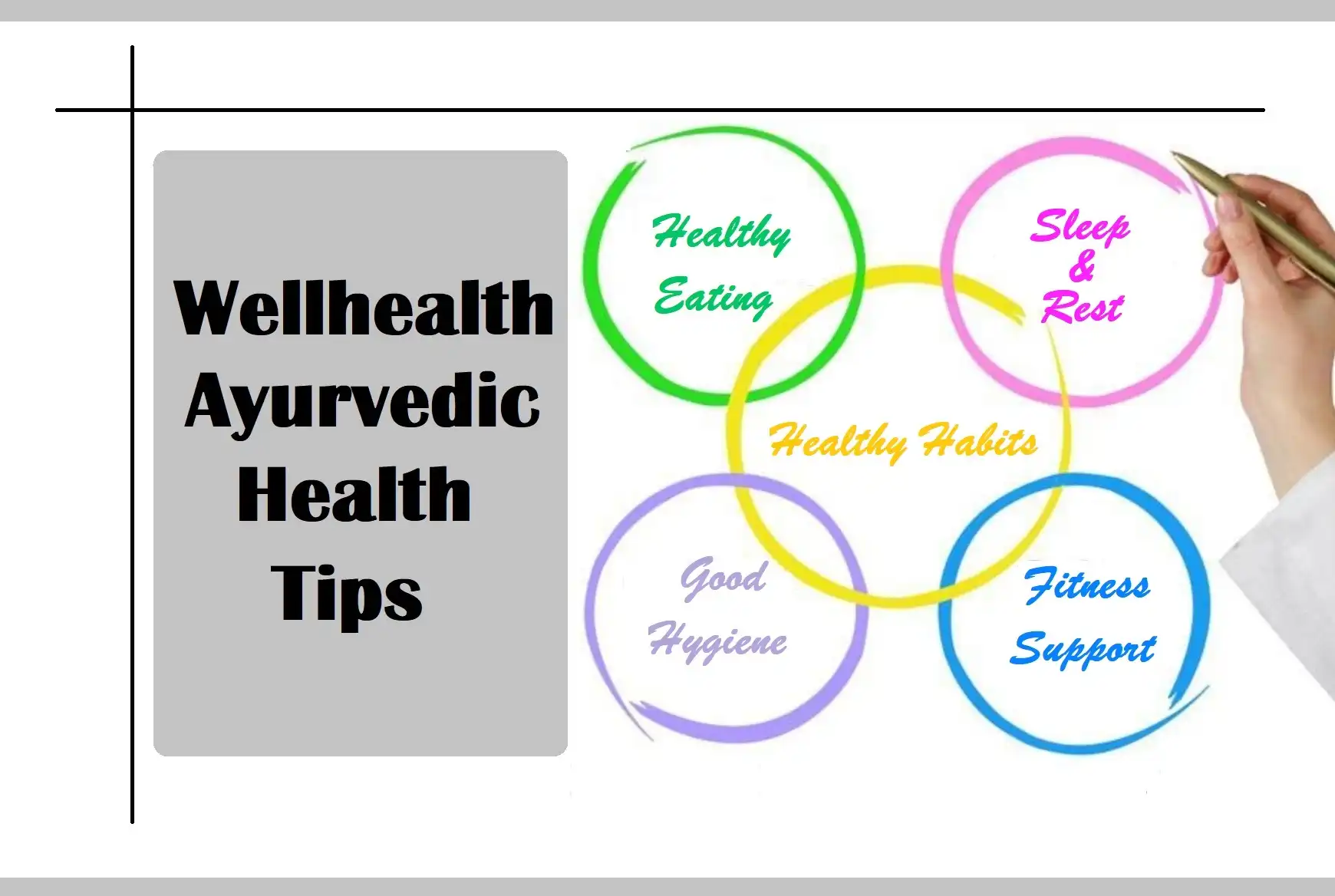
Health is one of the most important benefits that human life is endowed with. But at the same time, it is also one of the most fragile and vulnerable areas of our existence. Congenital and acquired diseases, as well as stress, poor environment, and poor lifestyle – all negatively affect our health. A healthy lifestyle has a positive impact on health for many reasons. A healthy lifestyle focuses on balance in our body and mind. Some common Wellhealth Ayurvedic Health tips include eating a balanced diet, getting enough sleep, and managing stress are the pillars of a healthy lifestyle. It also suggests using herbs and natural remedies to treat health issues. It’s all about holistically promoting overall well-being.
The Philosophy of Ayurvedic
The philosophy of Ayurveda is aimed at identifying the symptoms of the disease, understanding their negative impact on the body, correcting nutrition and lifestyle, and maintaining a high level of physical and mental health. In Ayurveda, health is always balance, unity, and harmony of physiology, psychology, and emotions.
According to Ayurvedic experts, all diseases first appear at the level of consciousness. Negative emotions go to the levels of subtle energy, causing an imbalance, which leads to disruption of the functioning of organs and systems, and subsequently to various diseases. Ayurveda also places great importance on hygiene, proper nutrition, daily routine, physical and mental well-being.
Modern medicine recognizes the value of this ancient theory. More and more clinics specializing in the health principles of Ayurveda are opening around the world. Since 1985, Ayurveda has been recognized by the UN World Health Organization as the most effective alternative medicine system in the world.
What are Doshas?
Ayurveda states that man is made up of five elements: air, water, earth, fire, and ether. From these basic elements the doshas (human constitution) are formed: Vata, Pitta, and Kapha.
Each person has a unique combination of doshas, their combination determines his physical and emotional characteristics. When they are in balance, a person is healthy, but if there is disharmony between the doshas, this leads to the development of diseases.
Vata (Air)
Vata represents the vital force and controls all motor processes at the microcellular and macroscopic level – from the blinking of your eyelids to the movements of your muscles. This form of energy is also responsible for blood circulation, breathing, and the nervous system. People with this constitution suffer from nervous disorders, insomnia, skin diseases, constipation, back pain, and arthritis.
Pitta (Fire)
Pitta is closely related to the intellect, emotions, and digestion of food. It controls nutrition metabolism, and body temperature. Out of balance, these people suffer from insomnia. The skin of people with a Pitta constitution is susceptible to irritation, rashes, inflammation, and allergic reactions due to impaired immunity and digestion.
Kapha (Water)
Kapha is responsible for the construction of tissues of the physical body, adaptation, and stability of the body. It is associated with the functioning of the mucous membranes and the cardiovascular system, so people with such a constitution are most often susceptible to obesity, endocrinological disorders, metabolic disorders, and hypertension.
Prakriti and Vikriti
Prakriti is the Ayurvedic constitution of a person, which is given at the moment of birth. This unique ratio of doshas does not change throughout life. And vikriti is a temporary state, continuously changing depending on the influence of external conditions on the human body.
Ideally, all three doshas should be in balance and be as close as possible to the original Prakriti, but due to the influence of various negative factors, including lifestyle and diet, the doshas constantly tend to become out of balance. Therefore, the key task of Ayurveda is to bring the doshas into a state of balance and get closer to Prakriti.
Ayurvedic and Wellhealth
In the holistic haven of Wellhealth, the ancient wisdom of Ayurveda takes center stage as a cornerstone of its commitment to nurturing well-being. Ayurveda, an ancient Indian system of medicine, places a profound emphasis on the balance between mind, body, and spirit. Wellhealth seamlessly integrates Ayurvedic principles into its ethos, recognizing the profound impact this age-old wisdom can have on fostering optimal health.
Ayurveda is not merely a system of medicine; it is a way of life that advocates personalized and preventive care. Wellhealth embraces this philosophy by offering a curated selection of Ayurvedic products, supplements, and wellness practices that align with individual constitutions and needs. Through this comprehensive integration of Ayurvedic principles, Wellhealth seeks to catalyze a transformative journey towards sustained health and balance. Read on to explore Wellhealth Ayurvedic Health tips.
05 Best Wellhealth Ayurvedic Health Tips
Unlock well-being with the “05 Best Wellhealth Ayurvedic Health Tips.” Embrace ancient wisdom for a balanced life, nourishing your body and mind with holistic practices for optimal health.
Healthy Eating
- Drink more Water – An adult needs approximately 8 glasses of fluid per day. This amount includes all drinks and liquid foods (such as soups). But it is better to replace strong tea and coffee with clean water. Try to get into the habit of drinking a glass of water immediately after waking up: this will allow you to wake up faster and “wake up” the gastrointestinal tract.
- Don’t skip Breakfast – A hearty, balanced meal in the morning will keep you alert and strong until lunchtime. Coffee and cake will not work: the best option would be to combine cottage cheese or eggs, porridge, and fruit.
- Review your Eating Habits – Nutritionists advise preparing each meal in this way: half the plate is fresh vegetables, a quarter is a side dish (porridge or starchy vegetables), and another quarter is protein (meat, cottage cheese, eggs or fish). If possible, you should get rid of sugar and sauces to get used to the natural taste of food. Try to give up sweets, fast food, and snacks: at first, it will be difficult, but after a week or a week and a half, the craving for unhealthy foods will decrease significantly.
- Eat on Time – Try to go at least two hours without eating before going to bed. Distribute your meals throughout the day so that there is no break of more than 3-4 hours. But at the first feeling of hunger, be sure to have a small snack: this will reduce the risk of overeating during a full lunch or dinner.
Sleep and Rest
- Organize your Sleeping Area – The bed should be comfortable; the mattress and pillows should be firm enough to support your back while sleeping. Ventilate your bedroom in the evening. If light and sounds from the street bother you, use a nighttime eye mask and earplugs.
- Don’t Skimp on Sleep Time – To be healthy, an adult needs to sleep at least 7-8 hours a day. We can work hard for a while and stay awake for 20 hours, but in the end, this will lead to problems and poor health.
- Change Activities – The best rest is a change of activity. If the work involves physical labor, then when you get home, you shouldn’t immediately rush to repair and clean. Better take a warm bath, turn on music, and read a book. And if you’ve been sitting at the computer for eight hours, then in the evening it’s worth taking a break from the screen: go for a walk, do a workout, or cook lunch for tomorrow.
- Avoid Stress Whenever Possible – These are communication with unpleasant people, uncomfortable work, problems in your personal life, failures in creativity or favorite activities. If it is impossible to get rid of sources of stress, it is better to consult a specialist to learn how to properly respond to irritants.
Healthy Habits
- Create a Daily Routine – This will help organize time, work, and rest. With a clear routine, you won’t stay up late at night doing things, won’t skip meals or exercise, and will stop forgetting about the necessary rest.
- Do a Warm-Up – The more often you get up, the better it is for your legs, back, and heart. It is best to walk a little and stretch every 20 minutes. But activity even once an hour will save you from fatigue and restore your efficiency.
- Get Rid of Bad Habits – It’s hard, and you may have to turn to professionals. But the improvement in well-being and health after giving up alcohol, tobacco, and other harmful substances is worth all the effort.
- Avoid Unnecessary Risks and Practice Safety Precautions – Wearing a helmet while riding a bicycle or buckling up in a car is easy, but it can help prevent serious injury.
- Take your Time – There is no point in trying to acquire all these habits at once. It is better to start gradually so that they do not cause tension and become firmly established in your life.
Maintain Good Hygiene
- Body Hygiene – As you know, our skin performs the main protective function, protecting our body from the pathological influence of the surrounding world. If you follow the rules of cleanliness, you can help this largest organ of your body perform other functions – regulate temperature, metabolism, the functioning of the immune system, secretion glands, receptors, perform respiratory and other functions.
- Oral Hygiene – You should brush your teeth twice a day – in the morning and just before bed, without using another person’s brush. After eating, be sure to rinse your mouth with plain clean water. If you notice the development of any symptoms of damage to the teeth or gums, you must definitely consult a dentist. You need to visit such a doctor at least twice a year, even if nothing bothers you at all.
- Underwear, Clothing, and Shoes – Personal hygiene largely depends on the cleanliness of clothing; it is designed to protect the body from various contaminants, as well as from damage and contact with insects, etc. All underwear must be changed regularly after each wash, respectively, daily. The same recommendation applies to socks, knee socks, stockings and tights. It is necessary to wash clothes regularly, and you should not wear other people’s clothes or shoes. The clothing used must be fully consistent with the time of year and weather conditions, and it is advisable to give preference to products made from natural materials. Features of the cut of clothing or shoes must take into account the features of human anatomy and also correspond exactly to its dimensional data.
Fitness Support
- Introduce Physical Activity into your Daily Routine – Heavy training is not at all necessary: to be healthy, it is enough to walk at a brisk pace for half an hour. Gradually, you can start to give up elevators and get off two or three stops earlier. Activity in the morning will invigorate you, and a leisurely walk in the evening will improve your well-being and sleep. In addition, you can add little gymnastics to your daily plan.
- Maintain your Weight within Normal Limits – If you have a clear deficiency or excess weight, try to correct it. Both negatively affect the health of the musculoskeletal and cardiovascular systems.
Final Thoughts
Wellhealth’s holistic integration of Ayurveda extends beyond the realm of health, permeating into skincare, beauty, and relaxation. This nuanced approach recognizes that true well-being encompasses both inner vitality and outer radiance. As individuals embark on their wellness journey with Wellhealth, they are not only embracing a healthier lifestyle but also reconnecting with timeless traditions that have withstood the test of time.
In essence, Wellhealth invites us to rediscover the art of self-care through the lens of Ayurveda—a journey that transcends the fleeting trends of modern wellness and taps into the wisdom of centuries. It is an affirmation that a life well-lived is not only a reflection of physical health but an intricate dance of balance, nourishment, and alignment with the rhythms of nature. As we partake in this holistic expedition, Wellhealth beckons us to embrace the transformative power of Ayurveda—a beacon guiding us toward a harmonious, vibrant, and enduring state of well-being.
We hope you found this article helpful. If you did, be sure to check out our blog for more great content like this.





